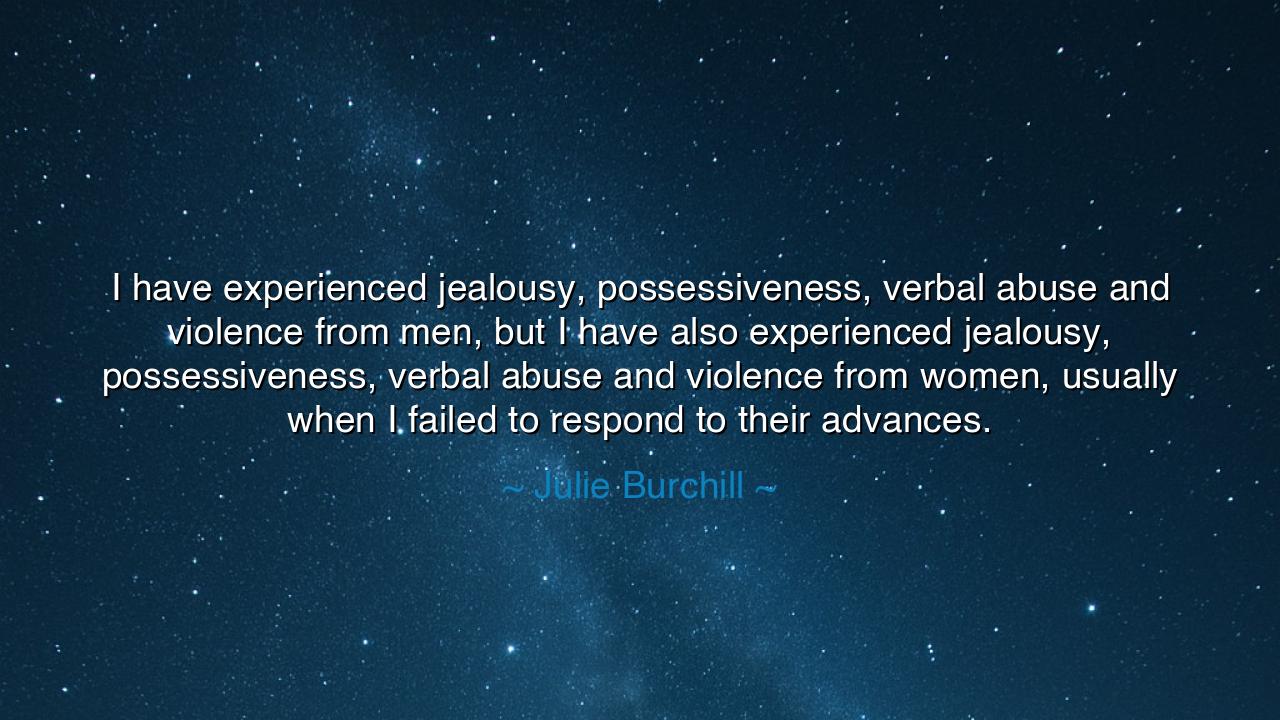
I have experienced jealousy, possessiveness, verbal abuse and
I have experienced jealousy, possessiveness, verbal abuse and violence from men, but I have also experienced jealousy, possessiveness, verbal abuse and violence from women, usually when I failed to respond to their advances.






In the fearless words of Julie Burchill, there burns a truth that few dare to utter: “I have experienced jealousy, possessiveness, verbal abuse and violence from men, but I have also experienced jealousy, possessiveness, verbal abuse and violence from women, usually when I failed to respond to their advances.” These are not words of bitterness, but of revelation — a stark reminder that jealousy, possessiveness, and violence are not bound by gender or role, but are afflictions of the human soul. Burchill, ever the provocateur and chronicler of human contradictions, exposes the universality of our darker impulses. Her confession is both personal and philosophical, cutting through illusions of purity and dividing lines between men and women to reveal a deeper truth: that power and desire, when corrupted by insecurity, can turn love into cruelty in any heart, male or female alike.
To understand the origin of this truth, we must look not to the battlefield of the sexes, but to the ancient battlefield of the self. From the dawn of time, human beings have been torn between love and the hunger for control. Jealousy, that green-eyed serpent of the soul, does not distinguish between man or woman; it dwells in anyone who confuses affection with ownership. Possessiveness is its twin — born from the fear of rejection, from the ache of being unseen. Thus, Burchill’s words rise not as an indictment of one gender, but as a lament for the fragility of all humanity. She names what is often left unspoken: that violence can be clothed in passion, and abuse can grow even in the garden of longing.
The ancients, too, saw this truth. In the tale of Medea, the sorceress who loved Jason beyond reason, we see love transformed into fury. When betrayed, she did not strike out as a woman against a man, but as a soul consumed by jealousy and humiliation. Her vengeance was not gendered; it was human. And in her madness, we glimpse the same destructive fire Burchill describes — the fire that burns in those who cannot accept rejection or indifference. The lesson is ancient yet ever new: that ungoverned desire becomes tyranny, and unhealed pain becomes cruelty.
Burchill’s confession also speaks to the illusion of moral division — that one gender sins while the other suffers. Yet history, from Cleopatra’s cunning to Henry VIII’s rage, shows that ambition, vanity, and envy flow equally through the veins of all people. Verbal abuse and violence are not the weapons of men alone, nor is emotional manipulation the art of women alone. Each heart holds the potential for compassion or corruption. Each of us, in our weakness, may wound those we claim to love. Burchill’s words therefore demand honesty — that we abandon the comfort of stereotypes and confront the shared shadows within us all.
But there is courage, too, in her revelation. To speak of such pain without self-pity is to reclaim power from it. Julie Burchill is not merely recounting suffering; she is naming it, taming it, turning it into wisdom. By admitting that cruelty can come from any direction, she strips away the false comfort of victimhood and replaces it with understanding — that human frailty, not masculinity or femininity, is the root of most harm. Such clarity is both liberating and humbling, for it demands that we look inward, not outward, to find the cause of our conflicts.
Consider the story of Buddha, who taught that hatred is not ended by hatred, but only by love and awareness. He saw that the source of pain lies within the human heart — its grasping, its craving, its refusal to let go. Burchill’s experience is but a modern echo of that truth. Whether from man or woman, jealousy arises from the same place: the fear of losing control, of being unseen, unloved, or replaced. Only through understanding and self-mastery can we silence that fear. To love without possession, to accept rejection without rage — these are the acts of true strength.
The lesson, then, is both personal and universal. We must rise above the blindness of jealousy and the chains of possessiveness. We must recognize that pain inflicted by others often mirrors pain they carry within. In ourselves, we must watch carefully for the first spark of envy, the first impulse to control, and quench it with compassion. To love is to grant freedom, and to accept that others owe us nothing but truth. Only when we learn this do we become masters of our hearts rather than slaves to our passions.
So, my listener, remember the courage of Julie Burchill’s words. She speaks not to divide, but to awaken — to remind us that cruelty wears many faces, and healing begins with honesty. Look upon others not as rivals or possessions, but as travelers in the same storm. Let love, when it comes, be generous and unbound; let rejection, when it comes, be accepted without wrath. For jealousy and violence may destroy kingdoms and hearts alike, but understanding — that divine light of awareness — can heal them both. In this, we fulfill the highest wisdom: to conquer not others, but ourselves.






AAdministratorAdministrator
Welcome, honored guests. Please leave a comment, we will respond soon